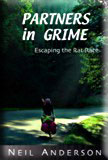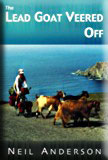
|
Thunder Breeding Grounds "I would rather be ashes than dust!
I would rather that my spark burn out in a brilliant blaze than
it be stifled by dry-rot. I would rather be a superb meteor,
every atom of me in magnificent glow, than a sleepy and permanent
planet." Stifling air roused us - the sun already well on its way toward popping the top off the old thermometer. What better way to spend an unbearable hot summer day than at a ball game in the sweltering sun? We sat in the broiling sun, watching a grueling sweat match while stewing in our own juices. "They should've used the bullfight arena pricing scheme," I complained by the fourth inning. "Seats in the sun: five bucks. Seats in the shade: ten bucks." Sue figured she'd have to phone her workplace and say she wasn't coming in because she had evaporated. I wondered if anyone had ever used that as an excuse before? Vicky, lucky as usual, arrived at 8 pm, just as the day cooled.
The following morning, Vicky struck any chance of sleeping in. She roused us early, eager to ride. Good thing. The forenoon was already heating up: another day in Hades was in the making. We invented several new terpsichorean activities while packing, fending off vexatious insects. On several occasions we buzzed to an enclosed shelter for a sanity break. Those little devils were driving us buggy! We exited the campground, and discovered why we hadn't seen any cyclists on Medicine Hat's roads. Broken glass was everywhere. The cyclists' nemesis reared its pointy head and poked fun at Sue. "Maybe it should be nicknamed 'Glass City,'" I stated flatly, watching her change her front tire. We escaped Glass City by a sliver, and soon caught up with a cyclist from Germany. Dirk's plan was to ride his mountain bike to Ontario. His biggest burden? An overstuffed teddy bear strapped to his rear rack to accompany him on his interprovincial journey. "For company," he said. "It gets lonely out here by myself." (The movie Cast Away bounced to mind, where Tom Hanks converses with Wilson, a volleyball, for years.) Dirk told us he was averaging around 170 kilometres per day - about double our Alberta daily distance. "What do you eat to travel distances like that?" I asked, expecting to hear the sordid details of some Ironman triathlete concoction. "Smarties!" he answered enthusiastically. The five of us cycled a few kilometres, chatting, exchanging war stories. But Dirk's tempo was a lot slower than our usual pace (he must have been spending 12 hours a day in the saddle!). Our philosophy was to crank out the kilometres at a good pace; slow enough to smell the roses, yet fast enough to get somewhere. We didn't relish sitting on our bikes all day. Sue, Vicky, and Sharon must have thought the same. They turned it up a notch, leaving Dirk and me staring after their rapidly disappearing backsides. I'd make some sort of crack here, but that would be rude. "Those girls ride like animals!" Dirk declared reverently. "Don't I know it," I replied. I bid him goodbye and blasted off, trying to catch up with the brutes. The ride to Cypress Hills was a grueling, hot, gradual, uphill slog through lonesome prairie. The only sound was the whir of our wheels and that of an odd grasshopper panicked into flight by our passage. (I hated when they landed with their little suction cup feet on my bare legs. It always gave me a start.) The landscape was 100 percent treeless. The only vegetation was a few tufts of sad brownish-yellow bunch grass and a smattering of bone-dry sagebrush liberally coated in moon-like greyish dust. "I'd never make a cowboy," Sue lamented, flicking her tongue across her pearly whites. "Even my teeth feel dusty." Cattle, utterly exposed to the pitiless sun, looked as miserable as we felt. Scorched, sunburnt, they stood there, expressionless, forlorn, chewing their cud. They did their best to elude the sun's searing rays by taking turns huddling in shadows cast by fence posts. "Ineffective," Sharon mused. "Looks like a 300-pound fat man attempting to hide from his wife behind a pool cue." "Yeah," I drawled, eyeing their parched state. "If a farmer tried to siphon those titties, he'd get evaporated milk." We crested a rise and stared in disbelief at a forest so green it practically dripped with emeralds. A sapphire blue lake glittered vibrantly in the harsh afternoon sunlight. The contrast to the burnt and stark prairie we had just traversed was like comparing Earth's silky tropics to the barren vermilion sands of Mars. A cool, sporadic breeze nuzzled our hot brows. "Hard to believe," Sharon spouted, drinking in the remarkable change of scenery. "A few minutes ago we were surrounded with nothing but bald prairie - the sole scenic highlight a dehydrated cow." Cypress Hills Provincial Park spans a portion of the southern Alberta-Saskatchewan border. Not only is Head-of-the-Mountain there, the highest elevation in Canada between the Rockies and Labrador, Cypress Hills also contains fossils of camels, dinosaurs, marine mollusks, and other exotic extinct mammals like sabre-toothed cats. French fur traders had named the hills. Historians theorize they mistook the lodgepole pine for Jack pine - 'cypre' in Metis and French Canadian. They called it 'Montages de Cypres' or 'Jack Pine Mountains.' The English translated it - wretchedly as usual - into Cypress. (Somewhat ironically, despite a wide variety of trees growing in the area, Cypress has never been one of them.) "I still think the original Native name was better," Sharon said. "Thunder Breeding Hills." First Nations people believe Cypress Hills to be a great spiritual grounds: the place where weather is born. And indeed it is. The area has a precipitous manner of spawning sudden thunderstorms. Sure enough, growling on the horizon, hoary, pit-bull-shaped clouds were snarling into anvil-topped thunderheads. Cypress Hills, or Thunder Breeding Hills, has a native history dating back several thousand years. First Nations people consider it a wondrous spiritual place, but its abundant water, wildlife, and trees provided for their physical needs. Campsite remnants have been dated back 6,000 years (probably congealed marshmallows). But, as they say, that's not all. Cypress Hills has the distinction of being the birthplace of the world's most famous police force. In 1873, Cypress Hills was the site of a bloody massacre. The story goes that one evening American wolf hunters had some of their horses go missing. During a search of the area they discovered a group of Assiniboine camped nearby, and assumed the Indians had stolen their nags. A bloody battle ensued. The slaughter killed many Indians and one white man. Likely, because of the one white man's death at the hands of red savages, Sir John A Macdonald - Dominion of Canada's first prime minister - enacted a bill establishing the North West Mounted Police. Today, the world over knows them as the Mounties, or the Royal Canadian Mounted Police. With their arrival, many whiskey trading ports, such as Fort Whoop Up, were abandoned. In the town of Elkwater, I checked my altimeter. "Hey, we've climbed 2,090 vertical feet since Medicine Hat," I announced. "That's the most uphill I've ever ridden in one day," Sue said, mopping her brow. "How do you feel?" I asked. "Like I need a stretcher," she groaned. "Every bone in my body aches." Not her best day apparently. It would come though. Her riding had improved remarkably since our Jasper-Banff tour a couple of years before. "Better make it a wheelchair," I kidded. "That way we can bungee it behind our bikes and tow you back if necessary." We trooped into a grocery store to buy a dozen wieners and some buns. "Why do wieners come 12 to a pack, and buns 8?" Vicky lamented. I shrugged. "Buy 24." Vicky thought that a good idea, bought two dozen of each, and added a pillow-sized bag of marshmallows to our purchases - just to round out our healthy eating habits. "Something for around the campfire." We headed for the 700 site campground. It looked like a veritable metal village; the weekend motor vehicle crowd already occupied most sites. "Would you guys like a walk-in site?" the attendant asked as we rolled up to the check-in booth. "Sounds great!" I said. "Where are they located?" "Oh," he replied, trying to sound nonchalant, "they're about 14 kilometres from here." "Fourteen kilometres!" Sue exploded. "Uphill," he added quietly. "Uphill!" Vicky cried in indignation. I thought she was about to smite the clueless guy with the marshmallow pillow. The last word a cyclist wants to hear after a tough ride is "uphill." "I don't think so!" Sharon declared. "They're really secluded and they -" "We'll take your closest site to the lake in the drive-in sites," I wisely cut in. We rode down to our beautiful lakeside site. "Is it just my imagination," Vicky asked, "or are there fewer campfires now that people have to pay for wood?" "It's not your imagination," Sharon confirmed. "There's definitely fewer. Smaller, too." The Alberta government had recently implemented a user-pay firewood fee. The year before, the park system had reportedly spent a million bucks on campfire wood. "I don't know what the big deal is," I said. "Most government money goes up in smoke anyway." We set up our tents, bought an armload of overpriced firewood, and roasted wieners. We used the coals to toast marshmallows, but made a rather smallish dent in the pillow. I was unlucky. Mine caught fire, and oozed off the stick. "What do you call that?" Vicky laughed. "Cajun," I answered. (No doubt some hapless archeologist 6,000 years in the future would be unfortunate enough to discover the sticky remains.) To work off our feast, we hiked Firerock Trail. The trail twisted upwards through a maze of poplars and pines. A meadow, filled with blue and yellow wildflowers, provided a splendid foreground to the sparkling lake. The sun set. A full moon, the colour of burnished copper, rose steadily in the east and guided us back to camp. Twinkling celestial bodies dotted the milky way like a thousand glistening sequins. "My gosh!" Vicky sputtered, staring upwards in wonder. "This is better than the Space Sciences Centre! I can't imagine what it must be like on a moonless night," she said, and spontaneously burst into a chorus of Starry, Starry Night. We weren't back in camp more than 20 minutes, stoking the fire with our remaining few sticks of wood, intent on cremating more marshmallows, when evening entertainment began in an adjacent site. Standing beside a raging conflagration, orange flames licking the night sky, a Johnny Cash imitator wailed out twangy country and western ballads. "They must have brought their own wood," Vicky decided, as we moseyed over to join the assembling crowd as the flames rose higher. By 10 pm, a large contingent of campers thronged round the burning ring of fire, listening to the guitar man's bawdy renditions. Everyone joined in for the rousing choruses. "This is better than television!" Vicky declared. Around midnight, the fire died down and the last of the rowdies roved off. We returned to our site - with all the hootin' and hollerin' beforehand there hadn't been much sense trying to sleep. I entered our tent and laid my sleepy head next to the partially eaten bag of marshmallows. "I hope I don't have that dream," I muttered. |


